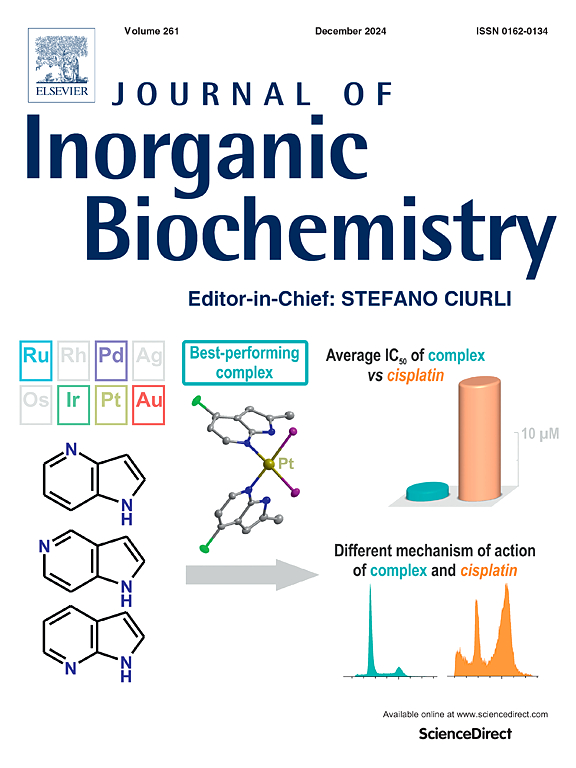Exploring Zn(II)-Acetyl l-carnitine complex for simultaneous management of depression, chronic pain, and neuroprotection
IF 3.8
2区 化学
Q2 BIOCHEMISTRY & MOLECULAR BIOLOGY
引用次数: 0
Abstract
Acetyl-l-carnitine (ALC) is synthesized in the brain, liver, and kidneys and plays crucial roles in energy metabolism, acetylcholine production, protein synthesis, and neuronal protection, contributing to its antidepressant and neuroprotective properties. Zinc, a vital biometal, is essential for depression and neuroprotection, exhibiting antidepressive effects alone or combined with classical antidepressants. The pharmacological benefits of metal coordination complexes often result from synergistic or additive effects. In this study, we present a novel multifunctional zinc complex, Zn(ALC)Cl2(H2O), which crystallizes in the monoclinic chiral space group P21, featuring a distorted tetrahedral Zn(II) environment. This new compound demonstrates significantly higher antidepressant activity, reducing immobility in the forced swimming test by 54 % compared to commercial ALC. Additionally, it exhibits in vivo antinociceptive properties, increases latency time, and proves effective in a diabetic neuropathy model by preventing the glucose-induced decrease in intracellular GSH levels. In vitro studies indicate that the complex can cross the blood-brain barrier and offer neuroprotection against glutamate-induced excitotoxicity and oxygen-glucose deprivation, with a drug classification of 10 versus 5 for ALC. Furthermore, under astrocytosis conditions, the Zn complex neutralizes the toxic effects of TGFβ-treated astrocytes. These findings highlight Zn(ALC)Cl2(H2O) as a promising candidate for treating depression and neurodegenerative diseases.

探索锌(II)-乙酰左旋肉碱复合物对抑郁症、慢性疼痛和神经保护的同时治疗作用
乙酰左旋肉碱(ALC)在大脑、肝脏和肾脏中合成,在能量代谢、乙酰胆碱生产、蛋白质合成和神经元保护中起着至关重要的作用,有助于其抗抑郁和神经保护特性。锌是一种重要的生物金属,对抑郁症和神经保护至关重要,单独或与经典抗抑郁药联合使用都有抗抑郁作用。金属配位配合物的药理作用通常来自协同作用或加性作用。在这项研究中,我们提出了一种新的多功能锌配合物Zn(ALC)Cl2(H2O),它在单斜手性空间群P21中结晶,具有扭曲的四面体Zn(II)环境。与商用ALC相比,这种新化合物显示出明显更高的抗抑郁活性,在强迫游泳试验中减少了54%的不动。此外,它在体内表现出抗感知特性,增加潜伏期,并通过防止葡萄糖诱导的细胞内GSH水平下降,在糖尿病神经病变模型中证明有效。体外研究表明,该复合物可以穿过血脑屏障,对谷氨酸诱导的兴奋性毒性和氧葡萄糖剥夺提供神经保护,ALC的药物分类为10,而ALC为5。此外,在星形细胞作用条件下,锌复合物中和tgf β处理的星形细胞的毒性作用。这些发现突出了Zn(ALC)Cl2(H2O)作为治疗抑郁症和神经退行性疾病的有希望的候选者。
本文章由计算机程序翻译,如有差异,请以英文原文为准。
求助全文
约1分钟内获得全文
求助全文
来源期刊

Journal of Inorganic Biochemistry
生物-生化与分子生物学
CiteScore
7.00
自引率
10.30%
发文量
336
审稿时长
41 days
期刊介绍:
The Journal of Inorganic Biochemistry is an established international forum for research in all aspects of Biological Inorganic Chemistry. Original papers of a high scientific level are published in the form of Articles (full length papers), Short Communications, Focused Reviews and Bioinorganic Methods. Topics include: the chemistry, structure and function of metalloenzymes; the interaction of inorganic ions and molecules with proteins and nucleic acids; the synthesis and properties of coordination complexes of biological interest including both structural and functional model systems; the function of metal- containing systems in the regulation of gene expression; the role of metals in medicine; the application of spectroscopic methods to determine the structure of metallobiomolecules; the preparation and characterization of metal-based biomaterials; and related systems. The emphasis of the Journal is on the structure and mechanism of action of metallobiomolecules.
 求助内容:
求助内容: 应助结果提醒方式:
应助结果提醒方式:


